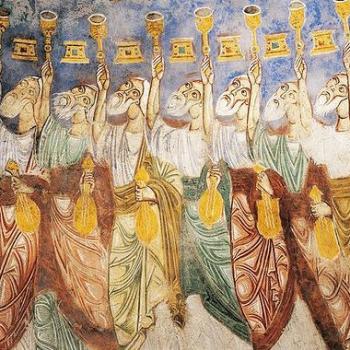Is Modern Unbelief Rooted in Christianity?
I receive many books from authors and publishers wanting me to review them on my blog. I try to do justice to as many of the “freebies” as possible, but some just don’t deserve my attention here. One that does surprises me. I strongly recommend it to you not because I agree with everything the author says in it but because it is surprising and challenging to the traditional “orthodox” interpretation of modern doubt and unbelief, secularism and even atheism.
According to author Dominic Erdozain, in his 2016 book The Soul of Doubt: The Religious Roots of Unbelief from Luther to Marx (Oxford University Press), much modern doubt and unbelief, secularism and even atheism, arises from religion and especially Christianity. Here are two signal quotes: “The philosophes [Bayle, Voltaire, et al.] were drawing on the moral capital of a religion [Christianity] they were attempting to destroy” (131) and “The Victorian conscience [John Tyndall, T. H. Huxley, et al.], like Voltaire’s, was more theological than scholars have acknowledged” (175). A third must be quoted: “Calvin played a larger part in the Victorian crisis of faith than Darwin.” (175)
Erdozain is a visiting scholar at Emory University. His first book, published in 2010, was The Problem of Pleasure: Sport, Recreation and the Crisis of Victorian Religion. I know nothing else about him…except that he is an exceptionally good writer. The Soul of Doubt is a pleasure to read if you are at all interested in intellectual history, the roots and development of modern Western culture, and the role of religion, especially Christianity, in all that.
This is a far-reaching and wide-ranging book that covers a lot of ground. The central thesis that ties it all together is that religion, especially Christianity, gave rise to modern skepticism about religion, especially Christianity, in two ways.
First, the harsh, nominalistic, all-controlling, wrathful, God of Luther and Calvin (and their orthodox Protestant followers) provoked a sharp reaction against Protestant orthodoxy. Similarly, the corruption within the Catholic Church gave rise to a reaction against Christianity in countries where that was the dominant religion at the dawn of the Enlightenment. Erdozain goes into great and agonizing detail describing Luther’s and Calvin’s cruelties towards perceived heretics and “false brethren.” His is not the usual repertoire; it uncovers and reveals surprising details I had not known before. According to him, the strong reaction of Enlightenment and later skeptics against orthodox Christianity would not have been as strong, if it had arisen at all, had Christendom and its leading theologians been less stringent in their lightning bolts hurled at everyone who disagreed with them about anything.
Second, the skeptics, the doubters, from the radical reformers to the “sectarians” of England during the Puritan Commonwealth (before and after) to the philosophes to Spinoza (!) to Feuerbach and Marx, all drew on specifically (if not exclusively) Christian conscience to react against Christian and all religious orthodoxy. In other words, what really gave rise to modern doubt and unbelief was not naturalism so much as religious conscience. Yes, of course, in especially Feuerbach and Marx (to say nothing of Nietzsche!) it arrived at naturalism, but the roots of modern unbelief lie historically and ideologically in Christianity itself. That is the author’s thesis.
It would be impossible to discuss all his case studies; there are simply too many embedded in the several chapters that cover much ground. One chapter especially interested me—Chapter 3: “The Metaphysics of Mercy: Calvin and Spinoza.” The author’s thesis, well-defended with numerous quotes from Spinoza and friends, is that Spinoza was not, as commonly believed, a pantheist or atheist. He was deeply religious in his own way and his “own way” developed out of his disgust with harsh, rigid, punitive religious orthodoxy which, in his own culture (what we today call the Netherlands), was Calvinism. Someone besides Erdozain has described Spinoza as the “God-drunk philosopher.” According to Erdozain Spinoza was actually some kind of Christian—at least in terms of his preference for the New Testament over the Old Testament and Jesus over Moses. The real reason he was expelled from his synagogue was not some atheism or pantheism but his preference for Christianity, at least in terms of his strong agreement with the Sermon on the Mount, over orthodox Judaism. According to Erdozain, Spinoza’s criticisms of organized religion and orthodoxy—whether Jewish, Catholic or Protestantism—arose not from some innate skeptical nature but from his religiously rooted conscience.
The upshot of the whole book is that the commonly taught and believed narratives about the Enlightenment have much wrong. The conservative Christian narrative, that portrays Voltaire, for example, as a wicked iconoclast against everything religious, especially Christianity, is wrong because Voltaire’s conscience was shaped by Christianity. His theology may have been heretical, but he was no atheist. He drew heavily on biblical teachings about, for example, mercy, to heap scorn on the state churches’ heavy-handed treatment of alleged unbelievers. The secular narrative, that portrays Voltaire, for example, as an anti-religious hero, a liberator from everything religious and champion of naturalism, is wrong because…what I said (that Erdozain argues about Voltaire) above.
Erdozain is not arguing that modernity’s skeptics and doubters were “the true Christians,” at least not directly. What he is arguing, apparently, is that they were not anti-religious iconoclasts out to destroy religion or even Christianity itself. They had more in common, he argues, with the radical reformers of the sixteenth century, especially the so-called “Spiritualists” (e.g., Müntzer and Schwenckfeld), than with twentieth century “new atheist” who seem only motivated by hatred of religion itself.
This is a book worth reading and even using in courses on modernity and religion. It is iconoclastic in its own way, but not motivated by iconoclasm for its own sake. Erdozain has shed new light, a new perspective, on modernity. If he is right, modern unbelief was brought about not by modern science or irreligious philosophy but by the cruel depictions of God and resulting cruel treatments of sincere people who simply disagreed with them by Luther, Calvin and other magisterial reformers and their followers. And it was brought about, at least in its beginnings, by Christian shaped (or at least Jesus-shaped) conscience reacting against those cruelties.















